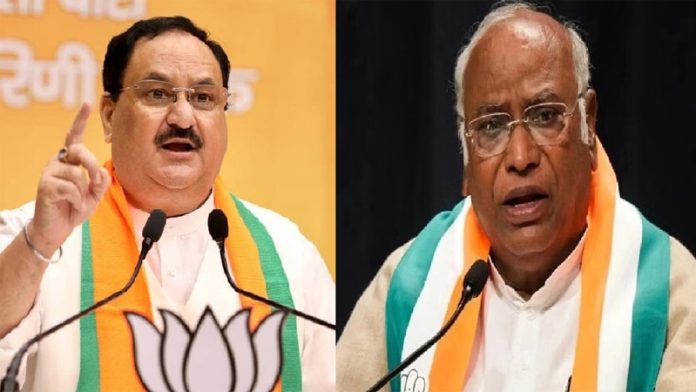‘Don’t politicise armed forces’
NEW DELHI, May 22:
The Election Commission today came down heavily on ruling BJP and opposition Congress, asking them to desist from campaigning along caste, community, language and religious lines.
Noting that the country’s socio-cultural milieu cannot be made a casualty to elections, it told BJP president J P Nadda and Congress chief Mallikarjun Kharge that utterances of star campaigners follow patterns and create narratives which can be damaging beyond the model code period.
Referring to their respective replies to the notices issued to them on April 25, the election authority said that “technical loopholes or extreme interpretations of other political party’s utterances” cannot discharge the parties and their campaigners from the core responsibility of their own content which ought to be corrective to the ongoing discourse “and not further plummeting the quality of campaign discourse”.
Follow the Daily Excelsior channel on WhatsApp
It reminded the two parties of provisions of the model code which state that no party or candidate will include in any activity which may aggravate existing differences or create mutual hatred or cause tension between different castes and communities, religious or linguistic.
Nadda was issued the notice on opposition charge that Prime Minister Narendra Modi gave a divisive speech in Rajasthan’s Banswara.
In his reply to the notice, Nadda had maintained that the statements of BJP’s star campaigners rely on facts to expose the “mal intent” of the Congress to the nation.
He had also told the EC that the Congress and the INDIA bloc, in pursuance of vote-bank politics, have begun opposing India as a nation, its identity, its original Hindu religion.
The poll watchdog rejected Nadda’s defence describing it as “not-tenable” and asked him and his party’s star campaigners to desist from campaigning on religious and communal lines. It also asked the BJP to stop campaign speeches that may divide society.
“The Commission expects BJP, as the ruling party at the Centre to fully align the campaign methods to the practical aspects of the composite and sensitive fabric of India.”
Along with Nadda, the EC had issued a similar notice to Congress president Mallikarjun Kharge, asking him to respond to the complaints filed by the BJP against him and the party’s senior leader Rahul Gandhi regarding their remarks.
The EC rejected Kharge’s defence too and asked the party not to politicise defence forces and make potentially divisive statements regarding the socioeconomic composition of the armed forces.
The Commission was referring to remarks made by top Congress leaders on the Agnipath scheme.
It also asked the Congress to ensure that its star campaigners and candidates do not make statements which give false impression that the Constitution may be abolished or sold.
The EC asked the presidents of the two national parties to issue formal notes to their star campaigners to correct their discourse, exercise care and maintain decorum.
The EC told both Nadda and Kharge that elections are a process when political parties, not only contest to win, but also avails the opportunity to present themselves in their ideal best for the voting community to experience, emulate and build hopes on.
“The second part constitutes the more precious heritage of Indian elections and our electoral democracy and this should not be allowed to be weakened by anyone, including your party,” it said.
Political parties, the EC said, are in the task of nurturing leaders for the country for present and future.
They cannot afford to be lax in any manner in enforcing discipline and conduct among the cadre in the high-stake electoral space, especially with reference to senior members, it said.
While issuing them notices, the EC had invoked provisions (Section 77) of the Representation of the People Act to hold party presidents accountable as the first step to rein in star campaigners.
According to the poll panel, it has taken a view that while individual star campaigners would continue to remain responsible for speeches made by them, the Commission will address party chiefs “on a case-to-case basis”. (PTI)


